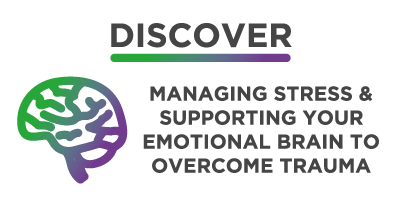Traumatised people simultaneously remember too little and too much: too little story and too much sensation. The sensations don’t make sense without the story and can, therefore, become overwhelmingly frightening or enraging. Ordinary memory is adaptive (our stories are flexible and can be modified to fit the circumstances) and essentially social (a story that we tell for a purpose). But, there is nothing social about traumatic memory. Re-enactments are frozen in time and are always lonely, humiliating, and alienating experiences.
Dissociation involves splitting off and isolating memory imprints. When people dissociate their traumatic experiences, they become unable to integrate their traumatic memories and seem to lose their capacity to assimilate new experiences as well. Unless they become aware of the split-off elements and integrate them into a story that happened in the past but is now over, they will likely experience a slow decline in their mental and physical wellbeing. If the problem is dissociation, the goal of therapy is association: integrating the cut-off elements of the trauma into the ongoing narrative of life, so that the brain can recognise that “that was then, and this is now”.
A lack of verbal memory is central in trauma and if a person does not remember, they are likely to reproduce an action, repeating it, without knowing that they are repeating it: this is their way of “remembering”. If the person can clearly remember the event by which they were provoked, and arouse its accompanying sensations, and describe both the event and sensations in detail, then re-enactment is no longer necessary or compulsive. Recollection without sensations rarely produces this result: with severe trauma just talking is not enough. When traumatised people re-enact rather than remember it can be very challenging to try to help them. If doctors, police officers, and social workers don’t recognise that someone is suffering from traumatic stress and if the person can’t identify the source of their behaviour they are likely to be labelled as insane or punished as criminal rather than helped to integrate their past.
Sometimes, the memory of trauma can be repressed, only to resurface years later. If a memory is inaccessible, then we are unable to change it, but as soon as a story starts being told, particularly if it is told repeatedly, it changes. The act of telling changes our perception of what happened. We cannot help but make meaning out of what we know, and the meaning we make of our lives changes how and what we remember. Understanding why you feel a certain way does not change how you feel, but it can keep you from surrendering to intense reactions. Silence about trauma reinforces isolation: when a person becomes able to say aloud to another what happened to them, it is a sign that healing can begin. You may think you can control your grief, terror or shame by remaining silent, but talking therapy offers the possibility of a different kind of control. Feeling listened to and understood changes our physiology: being able to describe a complex feeling and having our feelings recognised stimulates our emotional brain.
Hiding your feelings takes an enormous amount of energy, saps your motivation to enjoy life, and leaves you feeling shut down. Meanwhile, stress hormones keep flooding your body, leading to headaches, muscle aches, problems with your bowels or sexual functions and irrational behaviour that may embarrass you and hurt the people around you. Getting perspective on your fear and sharing it with another can re-establish the feeling that you are not alone. Discovering yourself in language is liberating, even if finding the words to describe your inner reality can be challenging. Being able to perceive deep inward sensations leads to emotional awareness. If a client tells me that he was eight when his father deserted the family, I may stop and ask him to check in with himself. What happens inside when he tells me about that boy who never saw his father again? Where is it registered in his body? When you activate your gut feelings and listen to your heartbreak, things begin to change.
With traumatised clients, confusion and silence are not unusual in therapy. I know that they can become overwhelmed if I keep pressing for the details of their story, so I’ve learned to alternate my approach. I don’t avoid confronting details, but I teach my clients how to safely dip one toe in the water and then take it out again, approaching the truth gradually. Talking and listening are interspersed with mindful breathing exercises, arm movements, tapping acupressure points, grounding practices, and touch to create body sensations to counterbalance feeling out of control. Alternating between states of exploration and safety, between language and body sensations, between remembering the past and feeling alive in the present. There are many ways that we can work together to manage stress and support your emotional brain and many pursuits that you can try outside of therapy to speed up and compliment this process.
I offer a free initial telephone conversation, giving you as much time and space as you need to consider whether you’d like to come and meet me.






